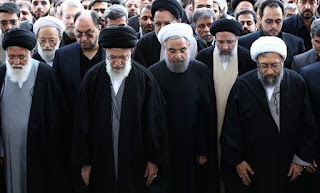Regime Change in Iran is a Terrible Idea
If there is anything that the world has learned in the past 30 years from the Islamic World, it is that sudden regime change without any real plan for the aftermath is a bad idea. As Iraq and Libya melted down following the US quickly pushing dictators out of power and then leaving, it became a general consensus that any regime change needs a willing populace, a long term plan and occupation, and a dictator who has already begun to lose his grip on power -- the US shouldn’t be pushing countries over the edge.
Secretary of State Rex Tillerson, evidently, thinks differently. In a recent meeting, Tillerson hinted at US policy pushing for peaceful regime change in Iran. Tillerson joins notable GOP hawks, such as Tom Cotton (R-AK) in supporting regime change against the Shiite Theocracy. Trump’s CIA director, Mike Pompeo, also called for regime change in Iran when he was still a representative, back in 2016.
This isn’t just a bad idea, no. This is, quite possibly, the worst idea ever suggested by any US government official with an inkling of power.
It is impossible for “peaceful” regime change in Iran to ever occur. Iran is, to some extent, a democracy. However, Iran is, at its core, a theocracy. Supreme Leader Ali Khamenei picks the guardian council, who in turn selects who can or cannot run for president. A candidate who opposes the theocracy, therefore, could never be elected, as the guardian council (which is also made up of various theocrats) would reject the candidate and stop him from running.
The US has also proposed sanctions against Iran as a vehicle for regime change. As demonstrated in 2012, anti-Iranian sanctions only hurt Iranian people, rather than the Iranian regime. If anything, sanctions would only result in more (arguably justified) anti-western sentiment by the Iranian people. Sanctions drastically increase cost of life -- will the Iranian dad who can’t afford baby formula because of western sanctions really support a western revolution? Additionally, if the regime increases trade with its allies in Russia and China and ends the economic crisis, the regime would be viewed as heroic, rather than tyrannic.
Russia and China would certainly not be happy with the US attempting regime change in Iran. A rapidly developing Iran-China-Russia alliance is already strong enough to prop up Bashar Al Assad and overthrow the Yemeni government. If this alliance strengthens further (via Iran growing closer to Russia and China following an attempt for “regime change”), the consequences could be extremely dire for NATO.
Regime change via militaristic methods is even worse. Iran has one of the most powerful militaries on Earth, and with 80 million hyper nationalistic civilians, would be impossible to occupy. Any coup attempt would be thwarted by the powerful Revolutionary Guard, which solely exists to maintain the Islamic revolution and keep the Ayatollahs in power. Iran could also block off the Strait of Hormuz, therefore making it impossible for Saudi oil to reach the United States and potentially wreaking havoc on the US economy. Iran is also incredibly far away from US shores, and thus supply lines and logistics would be a nightmare to deal with. The countries surrounding Iran are no help either -- it is unlikely Pakistan or Turkey would support regime change, Turkmenistan would certainly oppose regime change and lacks US military bases to support an invasion, and Afghanistan and Iraq are engulfed in war. All of these, combined with Iran’s mountainous terrain, make Iran one of the hardest countries to invade, let alone force regime change.
Furthermore, there is the elephant in the room -- regime change is inherently unstable. Regime change takes what is generally a stable situation (Qaddafi in Libya, Saddam in Iraq) and turns it into at best a weak government (Libya) with little control, or at worst a full on power vacuum that is quickly filled by terror groups (Iraq). Iran would be no different. In the wake of Khamenei being overthrown, countless factions would arise. Kurds would rise in the North and attempt to create an independent Kurdish state. Saudi, Gulf backed militias would try and take control of the country, as they did in Syria. Shiite militias would fight back and try and restore the Ayatollah to power. Terror groups like ISIS and Al-Qaeda would have a field day -- and the presence of Uranium in the country is not comforting in this regard. A potential civil war in Iran would dwarf the Syrian civil war, kill or displace millions of people, and create turmoil in every corner of the already war-torn Middle East.
Regime change should not be the US’s objective when it comes to Iran. The US needs to, first and foremost, keep Iran’s power in check. Iran has puppets in Syria, and could soon have puppet states in Iraq and Yemen. Making sure Iran doesn’t spread its influence further should be the primary US goal in the Middle East. Secondly, the US must prevent Iran from gaining nuclear weapon. The Iran deal is working, and there is no need to tamper with it. The US doesn’t need more problems in the Middle East -- it needs less. Regime change in Iran is impossible -- and if it is successful, it is akin to opening up Pandora’s box. No good can come out of destroying the largest and one of the most stable countries in the region. Regime change is inviting a gargantuan civil war, more terror activity, and an angry Russia and China, not democratic ideals or a peaceful Iran.



Comments
Post a Comment